posted by Nastassia Lopez
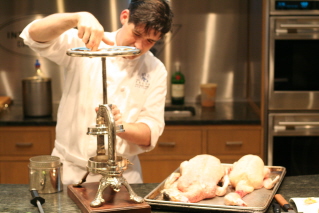
In the library of The FCI there lives an ancient, rarely utilized duck press. It sits on a block of wood—trophy style—and as Chef Jeremiah pointed out, “There are only two things missing on it: a basketball and a name plate.”
Traditionally, pressed duck is prepared like this: The duck is strangled so as to retain as much blood as possible. The legs are cut from the rest of the body, and thinly sliced pieces of the breast are cooked in a sauce of reduced Madeira, butter, and cognac. The rest of the carcass is partially cooked for 25-30 minutes and placed in a duck press, and the waiter screws the metal disc down to extract the liquids and marrow from the duck, onto the cooked breasts.
Dave had successfully pressed duck before but found it a tad too overcooked. He decided to give it another try, but this time using a modern technique—specifically low temperature cooking—that would give him more control over the temperature of the meat. Thus began the Great Duck Pressing Adventure.

We put our heads together and did our best to translate the recipe which we’re pretty confident said this:
Roast two beautiful ducks (that have been suffocated) on high heat for 25-30 minutes. Reduce Madeira, cognac, and lemon in a pan. When the duck is finished, disassemble and crush the carcass in a duck press to extract blood and other juices. Over high heat, reduce duck blood, foie gras, and butter. Add in the Madeira reduction. Grill the duck breasts to desired doneness and dress with the finished sauce.
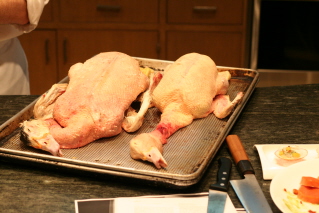
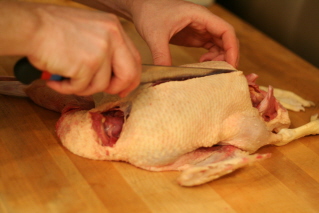
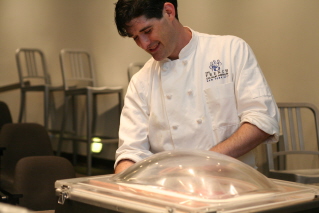
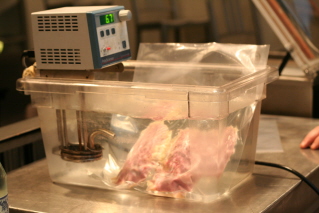
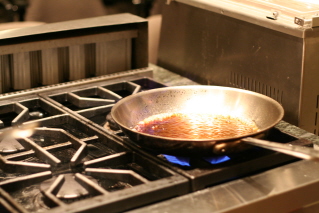

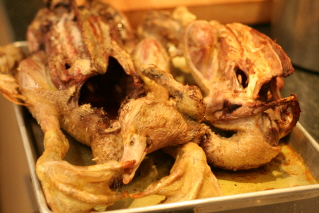
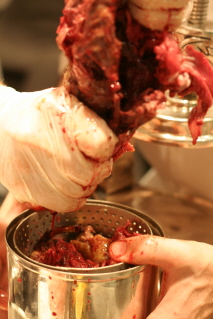
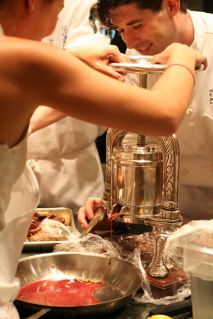
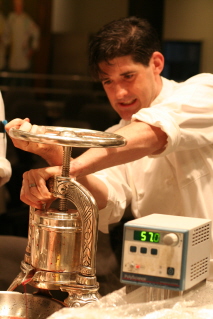
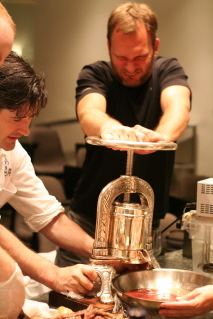

Now, in the middle of all the pressing, we noticed that a piece of the press’s metal had started to contract on one of the legs, while the large screw, which ratchets the disc down into the container, had slightly bent the lower disc.Â
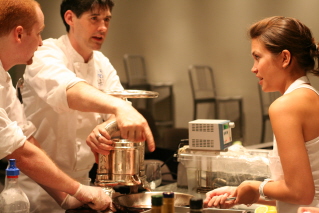
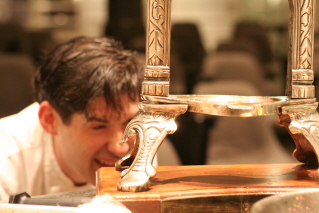
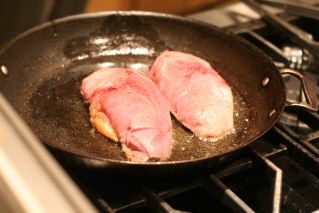
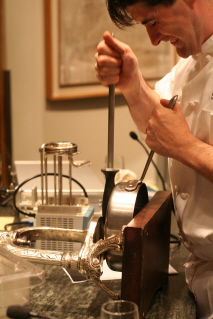
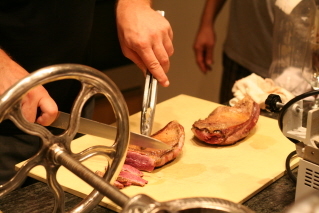
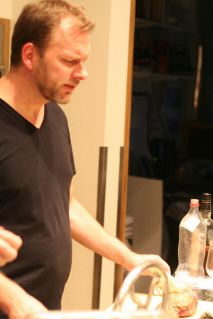
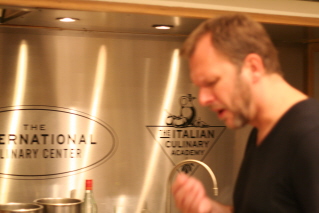

The duck wasn’t good.  We all agreed that the sauce was very flavorful though.
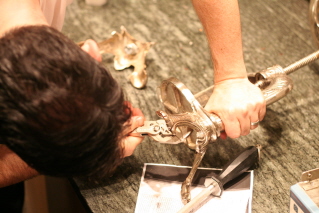
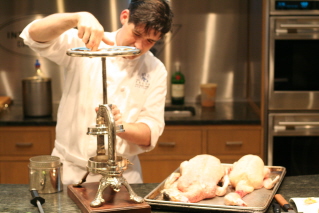
What happened to the broccoli you ask? After boiling for the entire hour we spent crushing, reducing, carving and fixing things, we drained the little floret and set it in ice water. It was still green.
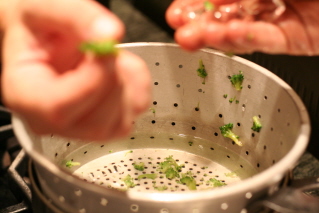
But why was our fowl so foul? We know that Dave has successfully pressed duck in the traditional manner, however, we have two theories on why this duck was a flop.Â
1. We think there may have been too much stress on the ducks when they died, and/or they were slaughtered improperly, somehow damaging the meat,and ultimately making it tough.
2. Perhaps pressed duck is simply supposed to be overcooked and that low temp cooking is not the way to go on a very traditional French dish.
And sometimes you just can’t mess with tradition.

guess this means a “research trip” to the Silver Tower would be in order!
I wish.
my first thought was the ducks had too much stress as well, not a very good way to go, i would rather them be killed more quickly than to suffer for some extra blood.
evidence… i mean pictures came out great of dave fixing/breaking/fixing the press
This is a strange experiment. Seems a lot of elbow grease and mess for un-exciting results. The whole post does, however, leave me with a couple of thoughts…
It’s hard to imagine that ducks wouldn’t be stressed when being strangled to death.
It’s hard to imagine that no one at the French Culinary Institute speaks French (that’s funny).
Could this be called ‘compression?’
I love it that Dave always takes things to extremes… whether shaking a cocktail or draining the living essence out of fowl.
HaHa.
Hi Chad,
We have many chefs who speak French. We didn’t have any there at the time. I would say it was some serious compression. Cheapo thousand-dollar french press….
Pan-searing in the “traditional” way doesn’t have to result in overcooking, does it?
The traditional recipe calls for a quick roast at high heat on a small duck. It is possible not to overcook it at this step, but the next step is to slice the breast very thinly and heat it in the sauce –invariably overcooking it (by our standards). I think that this type of duck just ain’t so good medium rare.
??? 67°F sous-vide duck not good? weird… I would incline towards the bad-slaughtering….
Patricio,
Sorry. The post should have read 57. This duck was no good at medium rare. I haven’t done any other tests with rare un-bled meat. The unbled striped bass in our ike-jime tests, however, tasted awful raw but not as bad cooked. Maybe there is a pattern?
In what way was the duck nondelicious?
Who strangled it?
Both the taste and the texture were bad compared to the ducks we normally cook as well as to the pressed duck we cooked traditionally before. I cannot reveal who strangled the duck. They asked us not to. Wasn’t us.
It’s tough to get a good sear in a Non-stick pan.
I did not heard of strangling ducks before. I am not sure I want my duck to be strangled. Gently force fed, I am somewhat fine with that, strangled? Not so sure.
Did some reading and bumped into this blog about the pressed duck, at the La Tour D’Argent. Writer said it tasted good, but the pictures of the dish is for a lack of a better word unappetizing, a thick blackish gunk that covered the duck. Duck was cooked medium rare and warmed only by the sauce.
What happens to the meat of a strangled duck…?
when you say the duck wasnt good. do you mean texture or taste. i have always preferred duck in a pan over sous vide, the duck seems too get to chalky and grainy in the bags. duck is very finicky after its cooked. serve to warm and its mushy serve to cold and its grainy. also what breed was it?
Howdy Asbel,
Normally, we do duck sous-vide at 57 (sometimes 58 for tough breeds) for 45 minutes, then let it cool, and sear off the skin as per normal. This is more sous-vide to insure the center of the breast is exactly where we want it. We love the results. Duck cooked a lot longer than that goes liver-y and loses its nice color. I think the bloody duck should be served more on the medium side. One of the ducks was Pekin. Don’t know about the other.
oh and 67 c seems a bit high, is that a temp that you prefer for duck?
Howdy Asbel,
should read 57C, will change.
I don’t understand the whole “strangling” thing or why it would have to lead to extra stress versus decapitation. Not to bee too graphic, but I’ve heard plenty of stories about how my grandparents would kill fowl back in the early 20th century: You reach down, grab yourself a chicken or duck by the head, swing it around a few times in a circle to completely break the spine, done. Now you have a dead duck or chicken, and it certainly didn’t take any longer than it would to chop its head off or slit its throat. At this point, if you want to bleed it, you hang it up, snip the head off and bleed it out. For the purposes of pressed duck, you wouldn’t bleed it out.
what’s all this non-sense about stressed ducks?
there might be a tiny difference in texture from a stressful death to a very peaceful one,but to think that meat or fish becomes inedible as a result of stress is rather silly,
ducks are killed the very same way in most “abattoirs” yet you can still savour great magrets, livers, confits all over the world.
we just have to accept that not every meat is meant to be vaccum poached, that’s why cooking is exciting!
been cooking ducks( both magret and pekin) sous vide for a few years now, results have been great even at a lower temp. I agree that too long results in poor texture and a liverish taste but i think that is common among most meats cooked sous vide ( the texture part) to medium rare. I can only imagine that not bleeding results in poor taste, and stress results in bad texture; are there any meats that are meant to be eaten before being bled?
We do a Canard Presse at my restaurant. It is quite popular! We prick the skin and poach the whole duck in boiling h20 for 1 min. Then let the skin dry and form a pellacle overnight. We roast it after letting it come to room temp, to rare on the breasts. The duck is presented, then brought back to the kitchen where the breasts are removed, the legs are put back in the oven, and the carcass and liver is put in the can of the press. A server presses the carcass in to a small copper pot and that is brought back to the kitchen where I make a sauce. I emulsify foie gras in to it and pass it through a chinois, finish it with salt, pepper, vinegar….the vinegar and foie take the place of butter and wine/liquor. It is served in 2 courses. Our ducks still retain enough blood to make the traditional sauce au sang. Delicious!
Awesome Erik,
Please post a link if you have it. The ducks are killed normally?
I think the technique is simply not the best…should marinate, roast for caramelization, and then slice off hindquarters and breasts…make the sauce using the blood to thicken duck stock, wine, red currant jelly, et cetera for great tasting sauce…
cooking in bag does not create great flavors…
We’ve also done it completely traditionally. I disagree about the bag.
It’s hard to believe that this method of butchering an animal is considered Haute Cuisine, when so many Europeans are against the Seal Hunt in Eastern Canada. Strangle or suffocate a Duck is acceptable and kill a seal is barbaric. double standard, no doubt.